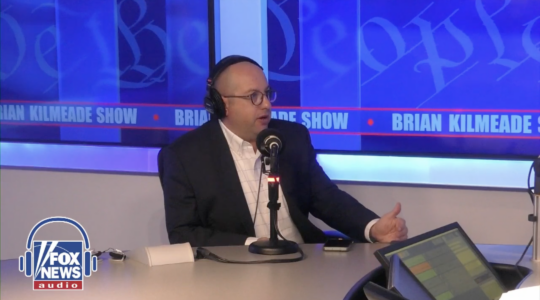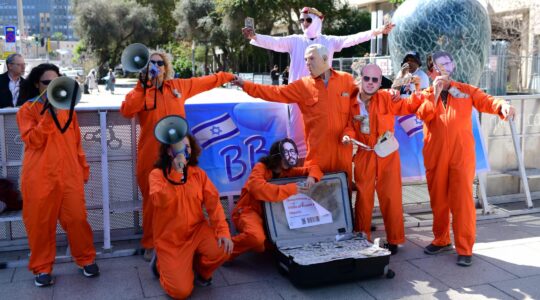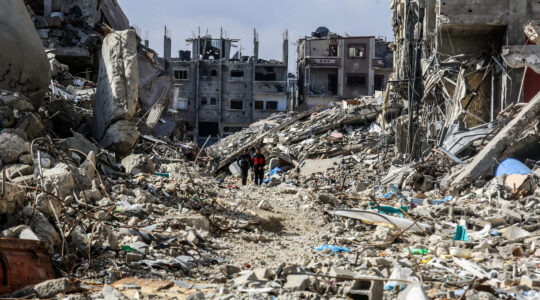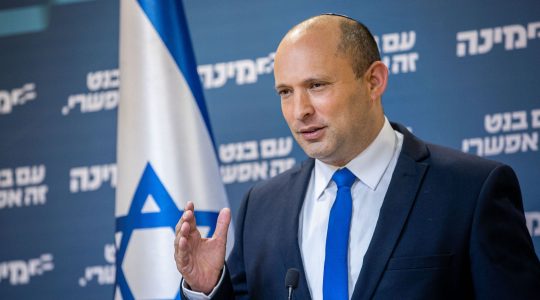TEL AVIV (JTA) — Singing “Shalom Aleichem,” the group of Maccabiah athletes usher in Shabbat together at a brightly lit hotel dining hall, their Hungarian, Spanish, Finnish and British accents momentarily melting into a unified chorus of Hebrew.
Leading them is an energetic young rabbi who has come to provide spiritual context to their first Shabbat together in Israel ahead of their participation in this week’s Maccabiah Games, the so-called Jewish Olympics.
“It’s exciting to be here getting to know Jews from other countries,” said Maxim Poljakov, 23, a member of the Finnish indoor soccer (futsal) team. “It’s a much stronger feeling of our Jewish identity being here than we have in our everyday life in Finland.”
The Maccabiah Games, which began in 1932, are intended not only to encourage athletic excellence, but also to foster a sense of Jewish belonging and pride among the participants.
So alongside running hurdles, swimming relays and cycling in the Negev, the some 8,000 athletes who have gathered in Israel for the 18th Games from nearly 60 countries also are touring the country and visiting historically meaningful sites such as the Yad Vashem Holocaust Memorial and Masada. They’re even taking part in mass bar and bat mitvzah ceremonies — some have never had one, others simply want to join along.
“It’s much more than a sports event,” said Ron Carner, the general chairman of Maccabi USA. “If it was only a sports event, it would have run once or maybe twice. I see it as a way to help perpetuate our culture.”
For Daran Bern, 22, an indoor soccer player for the English team, the time in Israel — his second trip after joining a Birthright Israel group — has been a revelation. Bern grew up in a home with a Jewish father and non-Jewish mother just outside London that was largely disconnected from the local Jewish community.
“I love learning,” he said, smiling as he discusses Jewish culture and heritage with his teammates. “The Maccabiah is a fantastic way of getting people to do what they love to do — sport — together with the religious aspect that someone like me knows little about,” Bern said. “There is always something in you that wants to know more.”
Ahead of the Games’ opening, the U.S. Maccabiah team of about 900 members spent several days exploring Israel. They gathered around campfires in the evening to share their experiences. One highlight: a group bar mitzvah ceremony under a full moon overlooking the Judean Desert at the Hebrew University of Jerusalem amphitheater.
Olympic swimmer Jason Lezak, 33, who chose to participate in the Maccabiah Games over the World Championships, was among those who took to the stage and joined in even though he had a bar mitzvah 20 years ago.
“To do it with so many other people at the same time was an experience,” Lezak told JTA.
Visiting the Western Wall, the holiest site in Judaism, was especially powerful even though he had to fend off a camera crew, Lezak said. Praying, he tucked a note in a crevice between its ancient stones.
“It’s hard to hard to put in words,” he said, trying to explain the experience. “It’s something I’ve never really felt before.”
Lezak says his Jewish identity has been enhanced in his first trip to Israel and by being around his fellow Jewish teammates.
“I think things will be a little different when I go home,” he said.
Sitting in a cafeteria at the Maccabiah Village, a group of athletes from the U.S. team exchanges moments that moved them — from simply knowing that they are among hundreds of other young Jews who take athletics seriously to specific experiences, like floating in the Dead Sea or walking along the southern steps near the Western Wall, where they could imagine their ancestors ascending to the Second Temple more than 2,000 years ago.
Bradley Williams, a lanky 20-year-old marathoner from Santa Fe, N.M., is heartened to meet other serious Jewish runners. He says it’s hard to gather a minyan at his Santa Fe synagogue, let alone find other Jews who run marathons.
Williams is impressed, too, by his encounter with the range of Jews who live in Israel. He and the other long-distance runners on the team have been training with an Ethiopian Israeli and met others who are not Ashkenazi, like most of them, but are from families that come from all over the Middle East and North Africa.
“The Jewish people now seem so much more diverse to me and it makes me feel like I’m part of a people that has so much to offer,” Williams said. “Judaism now feels much more interesting and much more alive.”
JTA has documented Jewish history in real-time for over a century. Keep our journalism strong by joining us in supporting independent, award-winning reporting.





